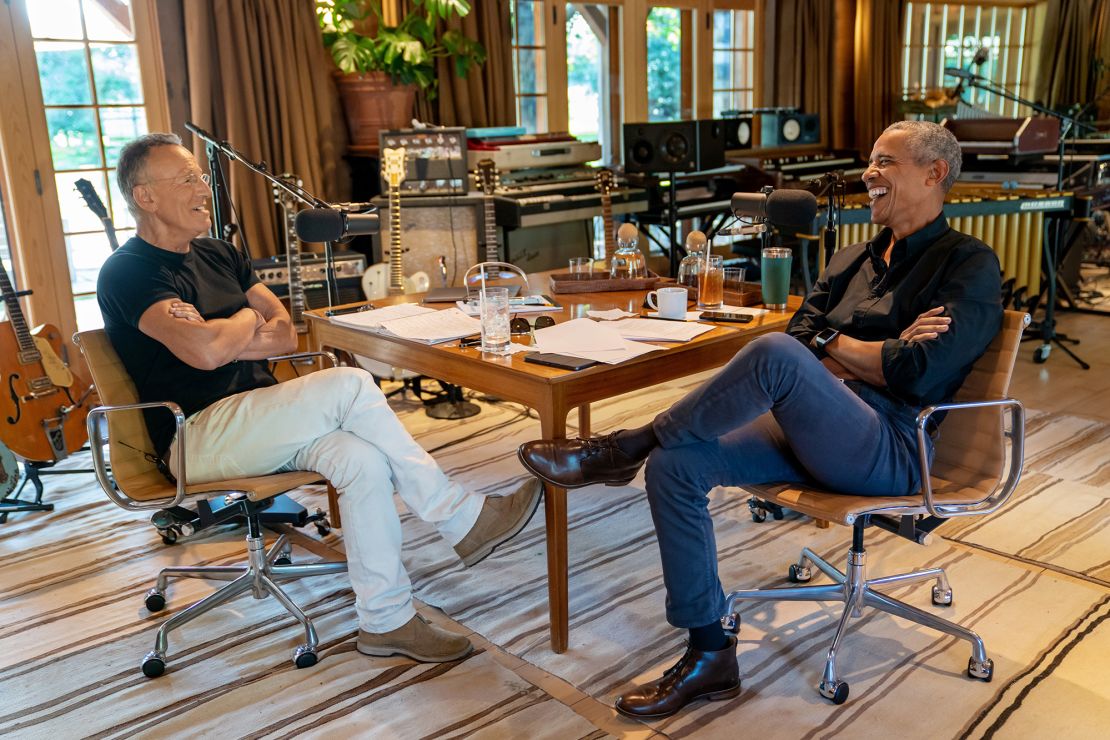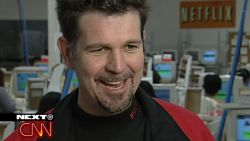Editor’s Note: Nicole Hemmer is an associate research scholar at Columbia University with the Obama Presidency Oral History Project and the author of “Messengers of the Right: Conservative Media and the Transformation of American Politics.” She co-hosts the history podcasts “Past Present” and “This Day in Esoteric Political History” and is co-producer of the new podcast “Welcome To Your Fantasy.” The views expressed in this commentary are those of the author. View more opinion articles on CNN.
If you had any doubts that podcasting had gone from fashionable to fully mainstream, you need look no further than the latest Spotify original, “Renegades: Born in the USA,” for proof that they have. Hosted by former President Barack Obama and current rocker Bruce Springsteen, the show centers on a series of conversations between the two men and their experiences growing up as outsiders. It is necessarily nostalgic — neither Obama nor Springsteen has been an outsider in a very long time — and the title reflects that, calling back to the hosts’ glory days: “Renegade” was Obama’s Secret Service name, and “Born in the U.S.A.” was Springsteen’s best-selling album, released in 1984.

The podcast’s release comes in the midst of a bit of controversy caused by the musician half of the duo (Springsteen’s Super Bowl ad for Jeep had been pulled after news broke that he had been charged with a DWI; that charge has been dropped and the ad returned to airwaves). But even before the charge was made public, the commercial itself had created an uproar. Pleading for unity in a time of deep national divisions, Springsteen called for Americans to overcome, even erase, the things that divide them — the same kind of call that Obama ran on in 2008.
Why was this familiar, even banal message a source of controversy? Because it badly misdiagnosed the problems we’re confronting. In a time of asymmetrical political radicalization, a call to “meet in the middle” still equally apportions blame for the division itself without demanding accountability for harm done. And it sounds nonsensical in the face of the challenges facing the country. Where is the middle ground on racism? On extremism or domestic terrorism?

“Renegades” offers more nuanced fare than the ad does, however. The premise is that these two men, despite their very different life experiences, have managed to build a meaningful friendship and have deep conversations about things like race in America. But Obama and Springsteen are not avatars of the divides in the US today. Setting aside that they are both fabulously wealthy men known around the world, they share a set of liberal values and a commitment to democracy that have been rejected by a significant number of Americans.
And so the solution — a conversation across the divide — may work for Obama and Springsteen, but it does not truly reckon with the structures and forces that are eroding American democracy, nor get at the deeper challenges around race and justice in the US. That’s clear in the way the show’s first two episodes unfold. They focus on race and racism, but in a sanitized way — the pair swap stories about their experiences with race from 30 or 40 years ago, no tough introspection or thorny dilemmas here. But it feels like it’s doing the hard work of thinking about race, and that will suffice for people whose primary goal is to feel like they’re doing that work.
Which makes it an odd addition to the podcast world at this moment. In the past year, podcasts have become one of the most important platforms for challenging, thoughtful conversations about race and racism. Podcasts like NPR’s “Code Switch,” which had been conducting smart, nuanced explorations of race and culture since its launch in 2016, saw their audiences grow rapidly during the racial justice protests of the summer. At the end of 2020, Apple Podcasts named “Code Switch” its show of the year, the first time the platform has made that designation.
“Renegades” also lands just as two controversies roiling the podcast industry illustrate the conceptual limits of “conversations about race” – and who claims the authority to conduct them.
At “Reply All,” a popular podcast produced by Gimlet Media (full disclosure: I’m the producer of a separate podcast from Gimlet and Spotify), controversy erupted after the show began a series about the racial reckoning at the food magazine Bon Appetit, where employees had come forward last summer with stories of systemic discrimination against people of color. For some who worked with the team at “Reply All,” the description of a toxic workplace for people of color hit close to home: It’s what they said they had experienced working with “Reply All“‘s host and senior reporter. Both have since apologized and left the show.
For “The Gist,” a Slate podcast, similar dynamics were at play: a White host, Mike Pesca, reportedly used the n-word more than once on shows about the use of the word. The second time that it happened, according to the Defector, a Black producer elevated concerns to editors, which resulted in an HR complaint. Despite the clear discomfort that the use of the word was causing, Pesca continued to defend its use in an extended argument with Slate colleagues about the recent resignation of New York Times reporter Donald McNeil, who used the word on a work trip in 2019. McNeil ultimately apologized, and the Times issued a statement saying “we do not tolerate racist language,” and that his resignation was “the right next step.” This week, Pesca was indefinitely suspended. Slate issued a statement saying the magazine was “committed to fostering a safe, inclusive and respectful environment for all employees,” while Pesca has called the accusations “very misleading and often inaccurate.”
It’s easy to look at the limits of the Obama/Springsteen project through the lens of these recent incidents and feel pessimistic. Simple requests for basic respect and equality have triggered industry-wide handwringing about “cancel culture” and “woke mobs.” But more hopefully, they have also led to introspection, expanded opportunities for people of color in media and, though slow and still incomplete, cultural change.
Ongoing change will require looking more closely at the core values of journalism and media. There’s precedent for this: Media values regularly change in response to shifts in politics and culture. In the 1950s and 1960s, wary of the power of extreme political ideologies, journalists practiced objectivity as a kind of skeptical and technocratic centrism. When political movements crowded out consensus politics in the late 1960s, journalists treated objectivity more as a both sides practice: Here’s a voice from the left and a voice from the right, and readers can choose which is more persuasive. Now there is a reckoning with the way objectivity has acted as a shield for Whiteness, and how it might become a more anti-racist practice.
For podcasting, there’s a somewhat different challenge: confronting the say-anything-debate-everything ethos incubated in the mostly White, male world of early podcasting. And it means taking a look at the limits of unity, too, in bridging a divide before the hard work of reckoning, and restitution, has been done.


















